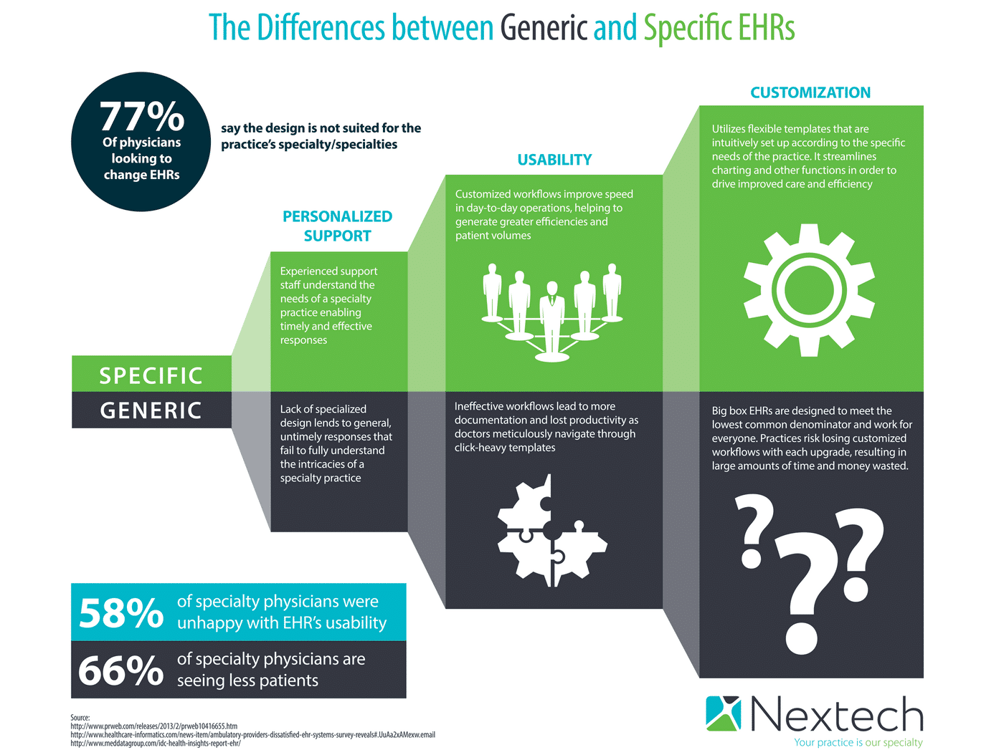 Electronic health records are revolutionizing the healthcare industry with more than 87 percent of physicians either in the process of implementing or already using an EHR throughout their day-to-day routines.
Electronic health records are revolutionizing the healthcare industry with more than 87 percent of physicians either in the process of implementing or already using an EHR throughout their day-to-day routines.
More and more, EHRs are the glue that holds medical offices together. Efficient EHRs can significantly impact the quality of patient care, from wait times to quality of doctor consultations. Depending on if the EHR is integrated with a PM, it’s also the foundation for scheduling appointments, billing and other important administrative tasks.
Unfortunately, EHRs are not all created equal and healthcare providers are unhappy with their present EHR software.
- 33 percent are dissatisfied with their current EHR
- 17 percent of providers are neither satisfied or unsatisfied
An ineffective EHR hinders practices from providing exceptional patient care, so here’s how to avoid the letdown of selecting an insufficient EHR.
Evaluate the practice’s needs
Selecting an EHR is a major decision and in any decision process, research is always a key component. Failing to take a deep look at your practice’s inefficiencies prior to selecting an EHR will likely force you to switch EHRs sooner rather than later. More than 75 percent of physicians who are dissatisfied with their EHR believe they didn’t accurately assess their practice’s needs.
Ensure it’s specialty specific
No one understands what your practice wants in an EHR more than a doctor in the same specialty. Generic big box EHRs may seem like a good idea, but without proper understanding of your practice’s specialty, how can they adequately fulfill your needs? Specialty specific EHRs recognize the day-to-day needs of your office, allowing for maximum productivity.
Usability is key
Confusion and inefficiency when using an EHR is never a good sign, but unfortunately it happens far too often in specialty practices.
- 58 percent of specialty physicians are dissatisfied with their EHR’s usability
- 85 percent of specialty physicians say their EHR slows them down
When selecting an EHR, an easy-to-use software is always the better choice. Simplified solutions provide physicians more time to focus on the patients’ needs and less time figuring out how to work their EHR.
Assess the support
Physicians are dedicated to the needs of their patients. Therefore, it’s essential that EHR vendors are just as dedicated to the needs of their clients. A vendor’s ability to listen and respond to questions, concerns or issues in a timely manner can make all the difference. An unresponsive support staff will increasingly frustrate your practice, especially when something goes wrong.
Selecting the right EHR can make all the difference in determining whether your practice is successful or not. Instead of rushing the decision and joining the 33 percent of physicians that are unhappy with their EHR, make an educated choice by applying these four suggestions to your decision-making process and avoid that dreaded EHR letdown.
See our infographic below to see some of the differences between generic and specific EHRs:

HERE ARE SOME RELATED ARTICLES YOU MAY FIND INTERESTING
Revenue Cycle Management | Healthcare Technology
Setting the Revenue Cycle for Success
By: Nio Queiro | August 29th, 2024
How Healthcare Chatbots Help Clinics Provide Better Care
By: Nextech | May 31st, 2024

